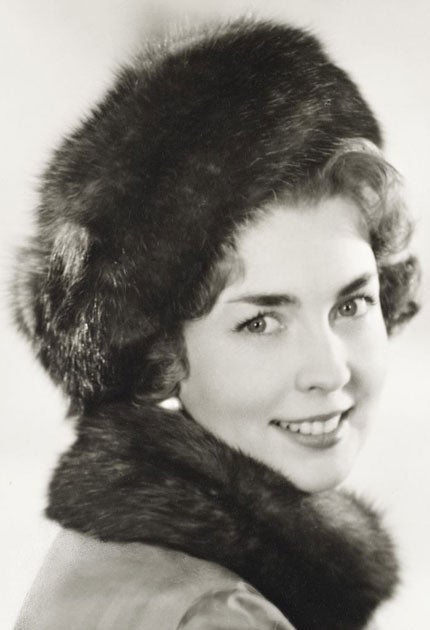Jane, Duchess of Buccleuch: Model turned politician’s wife whose efforts helped pave the way for disabled MPs

She was the châtelaine of three of the most beautiful stately homes in Britain, Boughton, near Kettering in Northamptonshire, Bowhill near Selkirk and Drumlanrig, Dumfriesshire, in the Scottish Borders; they were also among the best organised for tourists.
Jane Dalkeith was also an active, hard-working, and discreet MP's wife whose determination in adversity made it possible for her husband, the Earl of Dalkeith, MP for Edinburgh North, to return to his place in the Commons in the aftermath of a horrendous riding accident in which a neck injury left him partially paralysed.
The spectacle of Dalkeith manoeuvring his wheelchair into the Commons Chamber not only evoked the admiration of Harold Wilson and the rest of us. More than that, it was an important signal that disabled people could be Members of Parliament. Johnny Dalkeith, my parliamentary "pair", acknowledged as a matter of fact that "had it not been for Jane's perseverance, and her belief that I jolly well could return to work, I could not possibly have returned to Westminster."
Actually, her interest in disability was evident from her good works in Edinburgh before her husband's misfortune; it was enhanced by personal circumstances. Indirectly she paved the way for Ann Begg, MP for Aberdeen South, and others bound to a wheelchair. Granted she had the money at her disposal, but my wife and I were most impressed when we were invited to lunch à quatre at Bowhill to see the imaginative devices installed to ease Buccleuch's path in his home life.
I shall never forget the poignantmoment, when I asked Dalkeith at the end of a meeting of the Scottish Grand Committee if he had had difficulty getting through the Westminster traffic to arrive in time for the 10.30 start. "No," he replied, "but my wife and I have to get up a 4am in our house near Parliament for me to be here in time. It takes her two and a half to three hours to dress me!"
Dalkeith had been elected at a by-election in March 1960 triggered by the elevation of the then Lord Advocate Rt Hon William Milligan QC to the Judicial Bench in Edinburgh. Vividly, I remember coming back from canvassing on a filthy, cold, damp evening with a group of Labour Party activists. I met up in the committee rooms with Alex Reid, the good-humoured, good-natured postman who was the Labour candidate.
He said, half-joking but wholly in earnest, "I can match him" – referring to the Earl of Dalkeith – "but her [Lady Dalkeith] is a different matter. They all adore her. What can we do?"
The answer to the rhetorical question was "nothing much". She was a lady of beauty and charm who entranced thousands of the male and female citizens of Edinburgh.
Lined up in the tabloid papers, with veiled references in The Times and Daily Telegraph, Johnny Dalkeith had been the odds-on favourite to be the spouse of Princess Margaret (a subject which he would rightly and resolutely never even discuss). There was henceforth widespread surprise in 1953 when the stupendously eligible Earl chose to marry a commoner.
Well, Jane McNeill was not quite your ordinary commoner. She was the daughter of John McNeill QC of Appin and spent her childhood at Druimavuic House at Appin in Ayrshire. English readers have to understand that in Scotland ancient lineage may not involve the baronetcy. Dukes and marquises, let alone earls or mere lords, do not have the same cachet as the Camerons of Lochiel, the Clerks of Penicuik, the Macleans of Duart or the 45th McNeil of Barra. Albeit the McNeills of Appin were a rung below the McNeils of Barra, it did not prevent one wag writing a letter complaining how unseemly it was that Jane McNeil of Appin, in becoming engaged to a future Duke of Buccleuch, was marrying beneath her. Her father-in-law, as chairman of Buccleuch Estates, was the largest private landowner in Britain with an estate of 280,000 acres.
The apple of her father's eye, Jane McNeill had, inter alia, been a stunningly poised, elegant and successful model, most notably for Norman Hartnell. She married Walter Francis John Montagu-Douglas-Scott, Earl of Dalkeith and destined to become the 9th Duke of Buccleuch in 1953, in a ceremony the publicity for which was second only to the coronation. The Lordship of Scott of Buccleuch had been created in 1606, and the earldom in 1619 for the second Lord, who had distinguished himself in command of Scottish forces in the Low Countries. Created for the Duke of Monmouth in 1663, the title Duke of Buccleuch passed down to his descendents, who have successively borne the surnames Scott, Montagu-Scott, Montagu-Douglas-Scott and Scott again. In 1810, the third Duke of Buccleuch inherited the Dukedom of Queensberry, making the holder one of only five people to retain two or more Dukedoms.
Shortly after I arrived in the House of Commons, I asked Dalkeith why on earth he did not stand for Roxburgh, Selkirk and Peebles constituency as it then was – as he was chairman of the local Conservative Association it was his for the asking. "A wise bird does not foul its own nest," came the droll reply. Jane Dalkeith expanded: "Buccleuch Estates own a substantial part of the constituency. What would we do with consituents' inevitable grievances against the landlord? Go to ourselves and tell ourselves that we had a bad case?" She was a very down-to-earth lady, much loved in the Borders.
Jane McNeill, model and châtelaine: born Shanghai 19 December 1929; married 1953 Walter Francis John Montagu-Douglas-Scott (9th Duke of Buccleuch, 11th Duke of Queensberry; died 2007; three sons, one daughter); died London 18 April 2011.
Join our commenting forum
Join thought-provoking conversations, follow other Independent readers and see their replies
Comments
Bookmark popover
Removed from bookmarks